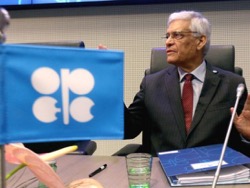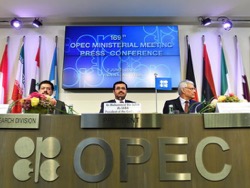
World oil prices began to decline after the news about disagreements in the camp of the OPEC. 28 September the cartel members first agreed to reduce production volumes of “black gold” almost a million barrels a day after oil prices jumped 5%. The final decision on this issue, the parties moved to a meeting in Vienna to be held on November 30.
However, a month before the meeting it became known that Iraq, despite the agreement, is not ready to go on the decline. Sunday, October 23, the country’s oil Minister Jabar al-Laibi stated that Baghdad needs additional funding to combat “Islamic state”, therefore, can not afford to freeze. Against the background of these news oil began to decline at the opening of trading on Monday. On Tuesday, Brent has played a bit of the decline, as of 12:00 cost 51,55 USD per barrel.
Given the fact that Iraq is the second largest oil producer in the cartel, unknown, would the rest of the country to divide 800 thousand barrels per day or arrangements will be disrupted. It also casts doubt on plans by Saudi Arabia to stabilize the oil market.
On October 23 at a meeting with the head of the Ministry of energy Alexander Novak Minister of energy of Saudi Arabia Khalid al-falih said that these talks were “an important point in the coordination process to achieve an agreement between OPEC countries and other oil-producing countries at the end of November” and demonstrate the willingness of Saudi Arabia to stabilise the market. In addition, he previously predicted that by the end of this year, oil prices reached $ 60 per barrel.
But international experts confidence Saudi Minister has not yet shared. On 19 October, the IMF predicted that by 2021, crude oil futures are trading below $ 60. The forecast oil prices for 2017 Fund established at 51 dollar per barrel. According to the forecast of the Russian Ministry of economic development, the average annual price of oil in the current year will amount to $ 41 per barrel, and in the years 2017-2019 — $ 40. However, the Ministry noted that this “conservative” forecast.
October 25 in Moscow with informal visit there has arrived the Minister of oil of Venezuela , Eulochio del Pino for negotiation and coordination between the oil producing countries within and outside OPEC. But if the differences there are even between members of the cartel would be something to negotiate on November 30 in Vienna?
— Of the 13 member countries of OPEC more than a third (Iraq, Iran, Libya, Nigeria and Venezuela) can’t afford not only reduction, but even stopping the growth of oil production, except in internal technical or political problems, — considers the analyst of the company “Finam” Alexey Kalachev. The other members of the club of exporters and Russia, as an observer, speaking the words over a freeze at the current high levels of production or even reduced according to the quota, in fact, continue to fight for the preservation of their share of General and regional oil markets.
“SP”: — But all they talk about, what to agree to a reduction?
Say, but in reality any refusal to fight for the preservation of its share will mean the removal from the market of the partner-competitor. So this whole thing with agreements is nothing more than informational support to current prices on the futures market. Such is the oil poker.
In the same vein, it is worth considering the calls for “stabilization of the oil market.” The market is quite stable since the spring, when after the February failure of the prices felt a real bottom, and the fly stared at the ceiling. Thanks to the negotiations of OPEC and regular information stuffing, prices have risen to the level of resistance near $ 55 per barrel and the support level was tightened in the area of $ 45 per barrel.
Now the participants are challenged to keep prices in this range. But not to raise them to 60 dollars and above, because all understand that when prices are high will resume active production of shale oil in the United States. Then the price of risk to fall again and have to start all over again.
“SP”: — That is, in fact, the current rates are optimal?
— Yes, by and large, current prices satisfy all participants. What could be higher? As the saying goes, “no good deed goes unpunished”. But the schedule may not degenerate into a straight horizontal line. In the range must occur fluctuations. So it’s no surprise the new contradictory statements and denials. There will be more positive predictions, and objections, and quotas, and their violations, and the entire stock of verbal interventions.
The problem of the oil market is not in limiting the growth of production countries-members and non-members of OPEC, and the slowdown in global demand for oil. Restriction of output will not significantly stimulate this demand, and that could be located outside the influence of OPEC.
The General Director of the national energy security Fund Konstantin Simonov believes that OPEC as an organization has outlived its usefulness and requires replacement.
— The fact that in this band “consent to the musicians there,” it was clear long ago. The risks came from Iran and Iraq. I’m not surprised that Baghdad has expressed such a position. By and large, a country like Iraq, no longer exists. The basic extraction is conducted in the region, called Iraqi Kurdistan, and is, in fact, a separate state.
Iraq is a set of territories, each of which controls some kind of gang. Operators of international projects who work there are forced to negotiate with local bandits.
In recent years the relations between the Kurds and Baghdad escalated, the Kurds refuse to pay. And since Iraqi Kurdistan supported by Turkey, they feel pretty confident. So that the Minister of oil of Iraq has expressed its position now, I see even a plus.
“SP”: — Why?
— Because it is much worse if he said it at the summit of OPEC. On the one hand, we see that there is no consensus on 30 November in Vienna will not. On the other, and so all have long known that OPEC, as a structure does not work and is not fulfilling its obligations. Comes to the absurd. At the recent Congress held in Algeria, the cartel has published a new report, where black and white was written that OPEC is violating its own quota. According to the established parameters of production needs to be at 30 million barrels per day, and they get a few million more. If you acknowledge that breaking their own decisions about what agreements can be said?
You need to understand that the issue of OPEC have been worked out, and the sooner the organization will die, the better. Rather, it is a disgrace to oil producers than it solves problems. If now to the last talked about the fact that Vienna will sign an agreement on the reduction, and then it all fell through would, it would create a negative background for the markets.
“SP”: — is There any alternative to OPEC?
— If we want to think about at least some regulation of the market, you need to create a new structure. The April summit in Doha could be the beginning of OPEC-2, a new structure on the bones of the cartel. Idea actively pursuing, discussed the composition of the participants. But then Saudi Arabia ruined the plan, and nothing came of it.
And yet, if Russia will be able to negotiate with Saudi Arabia, they catch up other countries, and we are quite unable to OPEC-2. Saudi Arabia, which failed agreement in April, is now beginning to change their attitude.
“SP”: — what is the reason?
— That they have in the budget a huge hole. They have a very low cost of oil production, so before they enlarged it and tried to compensate for the difference through volume. But now it is not working. Budget hole in the budget will not close any volumes.
They have a budget deficit several times higher than ours. If we groaning, but holding on, then they panic and it causes them to consider different options. The Saudis are frantically trying to find a way out of the situation. Now they came running to us, saying, we in April got a little excited, let’s negotiate.
“SP”: — can we agree with such unreliable partners?
— Of course, we trust we they can not. You need to very carefully consider what commitments we are willing to take. But if instead of or on the eve of the summit in Vienna, Russia and Saudi Arabia will sign at least a Memorandum of what they think about preservation of a production for 2017, this will cover the entire history of OPEC, and we will focus on the creation of a new structure.
It is clear that it will be a huge number of pitfalls, problems and difficulties. We in any case can not take on excessive obligations. It is clear that we are dealing with slippery guys who have already proved unreliable.
Our task is to nothing yet to formally promise anything, but in every way to make it clear to the market that we are willing to come to terms with Riyadh. This will allow for some time to keep oil prices around 50 dollars. The market is waiting for such news, it is dominated by the bulls, playing on the rise. However, the Western press since April, expects that they will turn into bears, but this is not happening.








